

JASR grants the following two certificates.
The Certificate of Social Researcher
The Certificate of Social Researcher is granted to undergraduate students who have not only acquired basic research methodology and analysis techniques but who have also attained understanding of social research processes ? from planning to reporting.
Students who have completed all of the qualified social research courses (Courses A to G, shown at right) and have graduated from a member university of the Certification Program will be granted this Certification.
The Certificate of Advanced Social Researcher
The Certificate of Advanced Social Researcher is a certification for professional researchers who are qualified as experts of social research. An individual who holds this certificate is assured to have the practical research abilities for planning, managing, conducting and reporting on a comprehensive research project incorporating various techniques, while also being adept at problem shooting and assessment of research project validity.
JASR grants the Certificate of Advanced Social Researcher (regular) to graduate students who, holding the Certificate of Social Researcher, have completed all of the required courses as stipulated in the Standard Curriculum (Courses H to J, shown at right) and who have written an advanced-level research paper in an area of social research at the time of completing the master’s degree. The Certificate of Advanced Social Researcher (by dissertation) can also be granted to academic researchers who have achieved highly professional results and to those in business who have already worked in advanced practical research in the field of social research.
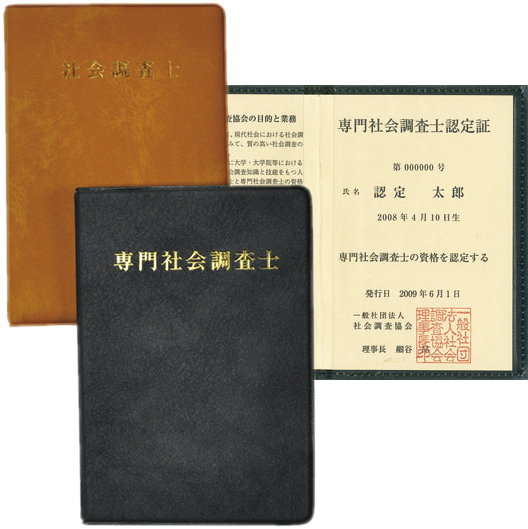
The Certificate documents:
The certificate document of the Social Researcher (light brown on upper left), the Advanced Social Researcher (blue black on lower left) and contents of the certificate document (displayed on right)
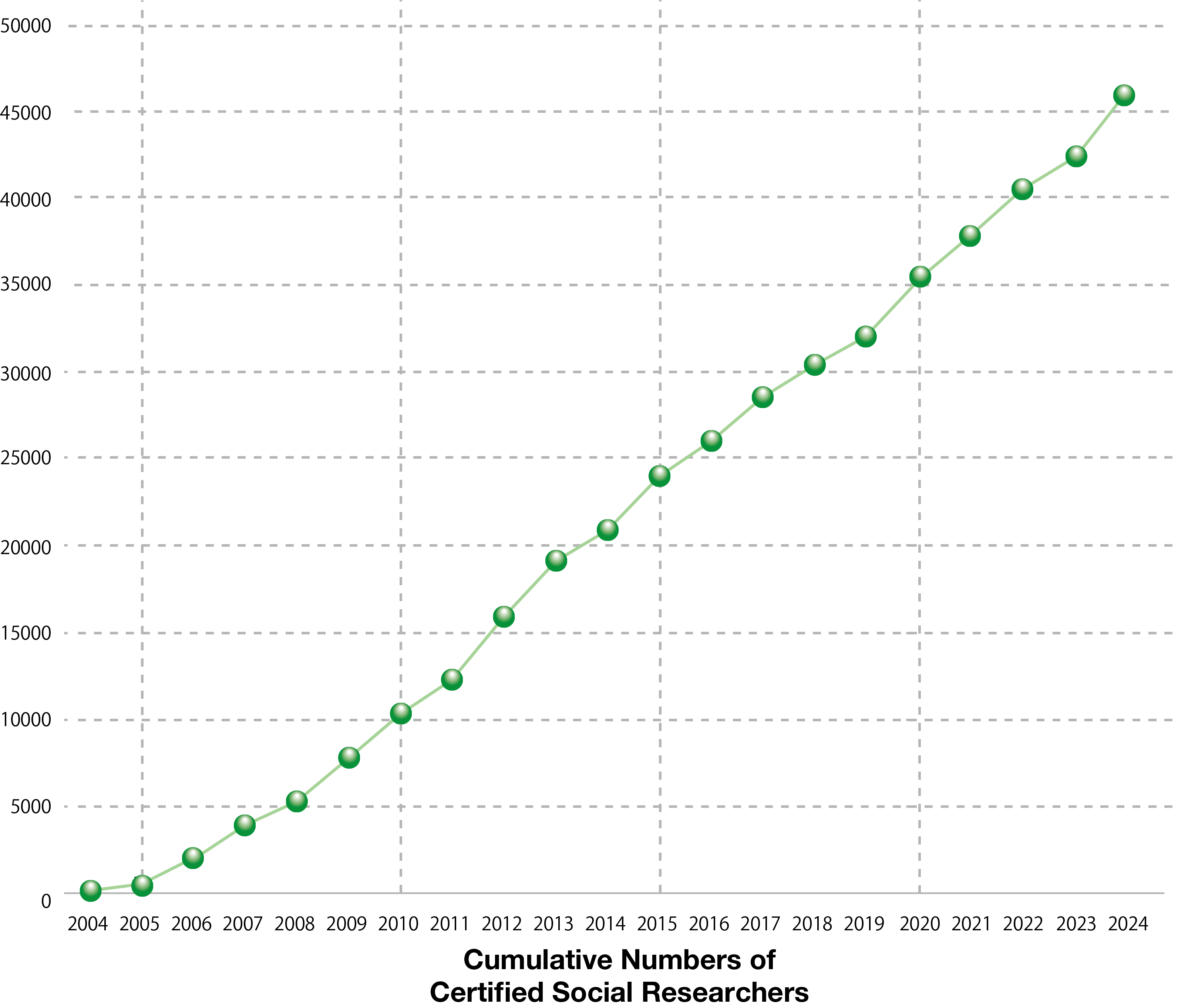
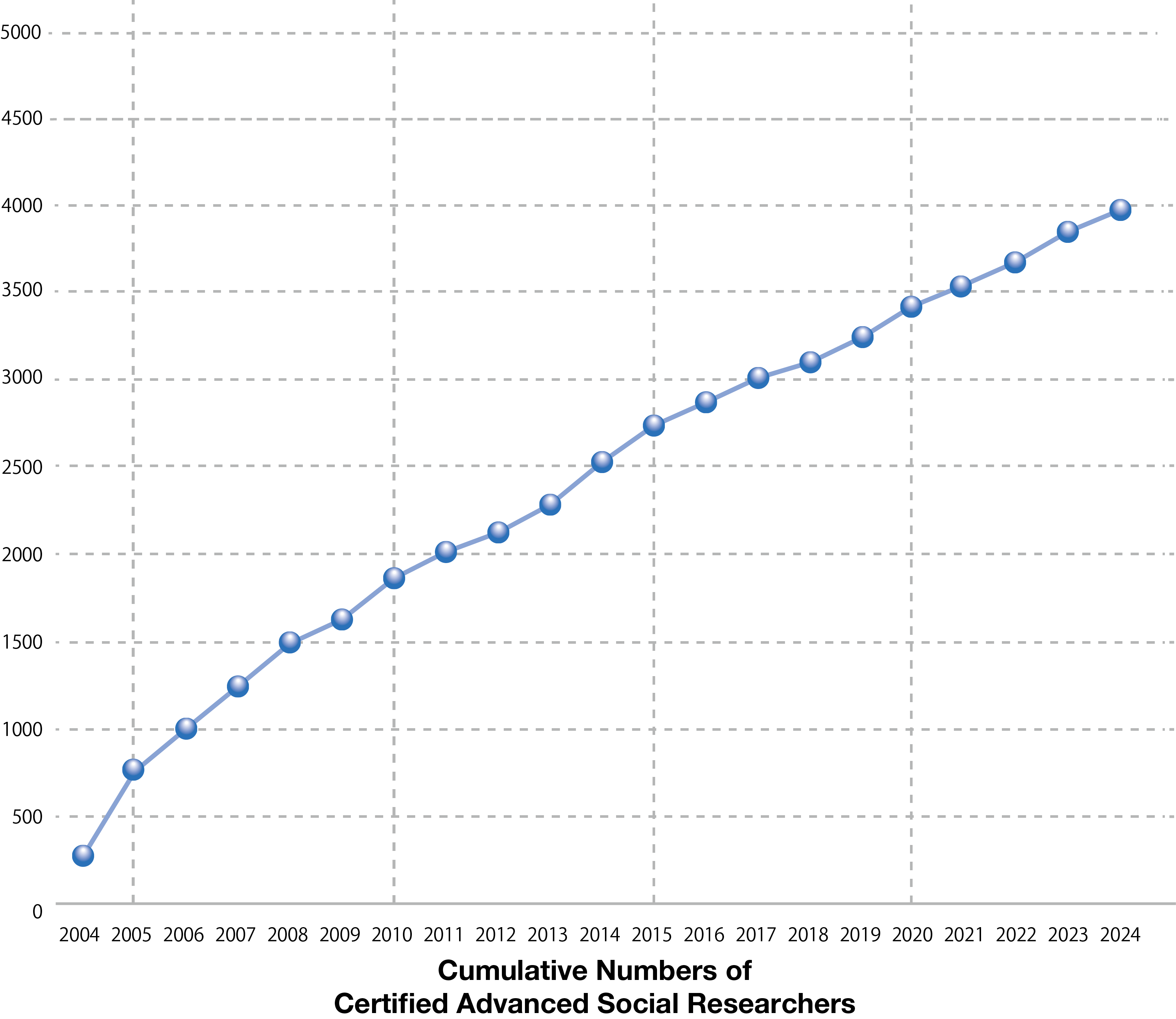
Cumulative Numbers of Certified Researchers
Since 2004, JASR has certified numerous Certified Social Researchers and Certified Advanced Social Researchers. The cumulative number of Certified Social Researchers reached 167 in 2004 and this has increased to 45,556 in 2024 (above left figure). In the past 21 years, the number of Certified Advanced Social Researchers reached 3,935 as a cumulative total (above right figure).
JASR sets forth the Standard Curriculum, which represents a set of standard courses for social research education that enables students to learn social research knowledge and skills in a systematic method. Member universities of the Certified Social Researcher Program prepare a curriculum comprising each course category from A to J according to the Standard Curriculum and submit this to JASR for qualification.
JASR then proceeds to review all submitted course syllabi and if acceptable certifies that the courses are appropriate for the Certified Social Researcher Program. In academic year 2025, JASR certified 2,582 courses offered at 199 universities and 268 departments.
JASR holds seminars in courses S1 and S2 for graduate students who wish to achieve the Certificate of Advanced Social Researcher (regular), but did not have an opportunity to obtain the required Certificate of Social Researcher on campus. Course S1 corresponds to social research Courses A, B, and C, while course S2 is equivalent to Courses D and E; both are courses in the Standard Curriculum for the Certificate of Social Researcher. Graduate students are allowed to apply for the Certificate of Social Researcher at the same time as they apply for the Certificate of Advanced Social Researcher (regular) if they complete courses S1 and S2 and pass the relevant examination.
These seminars, although principally targeted at graduate students, are also open to non-students who aim to improve their social research abilities. For practitioners, completing these seminars is counted as filling a requirement to achieve the Certificate of Advanced Social Researcher (by dissertation).
Furthermore, for those who wish to attain the Certificate of Advanced Social Researcher (by dissertation), JASR holds a seminar on advanced social research every year. This is comparable in content to Courses H, I and J in the Standard Curriculum, and equivalent to the graduate school-level professional education on social research methodology. For a person in the graduate school or in business, the completion of this seminar is counted as filling a requirement to qualify for the Certificate of Advanced Social Researcher (by dissertation).
Apart from certification, the seminar on advanced social research provides useful learning opportunities for researchers and practitioners intending to improve their competence in social research by acquiring advanced quantitative and qualitative analysis techniques and practical skills.
In order to maintain and improve the quality of practical social research training that is so essential to social research education, JASR provides financial support to several qualified practical social research training courses (Course G) after screening, and grants funding (up to \300,000) to partially cover training expenses. An applicant for this grant must submit a concretely drafted implementation plan and proof of inability to meet full expenses for the practical social research training. In academic year 2025, the Association provided grants to 7 universities to back up their practical social research training courses.
| In 2025, JASR provided a total of ¥1,810,000
to the universities noted below: |
|---|
| Konan University / Juntendo University / Niigata University
Hitotsubashi University / Fukuoka Prefectural University Mukogawa Women’s University / University of Marketing and Distribution Sciences |
JASR organizes symposiums and lecture meetings on professional research knowledge and techniques. Experts of social research from within Japan and abroad are invited as presenters. Every year in November JASR convenes two important events: a general meeting and a liaison professor meeting. Normally a symposium or a lecture meeting is also held on the same day.
To date, the following lecture presentations and symposiums have been convened:
| Lecture Meetings |
|---|
| 2009
Speaker: Wolfgang Jagodzinski (Professor, University of Cologne, Ex-President of GESIS, Ex-Director of Zentralarchive) Title: From a Data Archive to a Center for Data Documentation, Education and Research |
| 2010
Speaker: Mick Couper (Professor, University of Michigan, Institute for Social Research (ISR)) Title: The Nonresponse Problem in Surveys |
| 2011
Speaker: Takafumi Yoshida (Journalist, Asahi Shimbun) Title: Episodes of Reading People’s Mind |
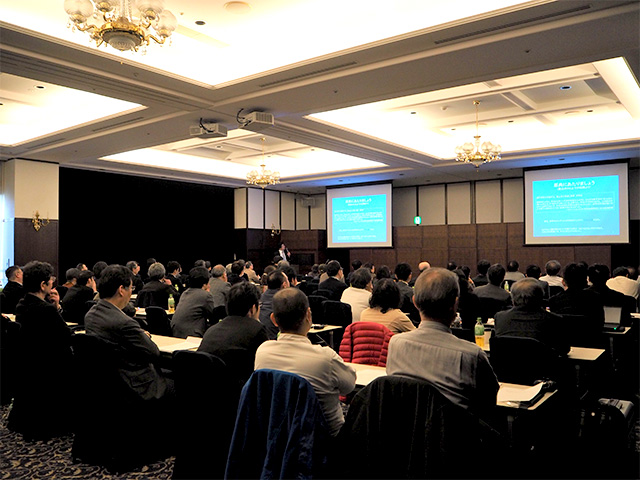
2019 Symposium
| Symposiums |
|---|
| 2010
Theme: Main National Surveys in Japan “Research on the National Character” by Ryozo Yoshino (Professor, Institute of Statistical Mathematics) “Japanese General Social Surveys (JGSS)” by Noriko Iwai (Professor, Osaka University of Commerce) “SSM Surveys” by Yoshimichi Sato (Professor, Tohoku University) |
| 2011
Theme: Earthquake Disasters and Social Research ? Practical Use of Research Results “The Roles of Sociology and Social Research in the Great East Japan Earthquake” by Yusuke Yamashita (Associate Professor, Tokyo Metropolitan University) “From Interview Surveys to Gaming: Crossroad Approach” by Katsuya Yamori (Professor, Kyoto University) “Recovery from the Great East Japan Earthquake and Scholarly Support” by Itsuki Nakabayashi (Professor, Meiji University) |
| 2012
Theme: Current Trends in Social Research Education “Current Situation and Challenges Facing Social Research Education: The Case of the School of Sociology, Kwansei Gakuin University” by Tsutomu Watanabe (Professor, Kwansei Gakuin University) “Social Research Education at Osaka City University: Between Tradition and Reforms” by Eiji Kawano (Associate Professor, Osaka City University) “Social Research Education and Achieving Certification of Social Researcher” by Saburo Akahori (Associate Professor, Tokyo Woman’s Christian University) |
| 2013
Theme: Current Situation and Challenges Facing Research Environment “About Social Research” by Hiroshi Akuto (President, Japanese Association for Social Research/Professor Emeritus, The University of Tokyo) “About Public Opinion Research” by Michio Yanai (President, Japan Association for Public Opinion Research) “About Marketing Research” by Takashi Makita (Chairman, Japan Marketing Research Association/President & CEO, Social Survey Research Information Co., Ltd.) |
| 2014
Theme: Change in Social Survey Environments and New Countermeasures “Present Situation of Interviewer-Administered Surveys: Issues and Countermeasures” by Hiroshi Aramaki (NHK Broadcasting Culture Research Institute) “RDD Telephone Surveys and Mail Surveys: What Do Social Researchers Need to Know?” by Yasushi Sato (Nikkei Research Inc.) “Present Situation Surrounding Web Surveys: The Influence of Smartphone Penetration” by Takahiro Nagasaki (INTAGE Inc.) |
| 2015
Theme: Practice of Qualitative Research and its Educational Effects “Social Research Education through Participant Observation” by Satomi Maruyama (Associate Professor, Ritsumeikan University) “On Multi-Disciplinary Qualitative Research” by Kokichiro Miura (Professor, Kwansei Gakuin University) “Is it Possible to 'Teach' Qualitative Research?” by Ryoko Ishikawa (Associate Professor, Matsuyama University) |
| 2016
Theme: Challenges and Potential of the Computer-Assisted Surveys “From Questionnaire to Tablet Device: Endeavour of the SSP2015 Survey” by Toru Kikkawa (Professor, Osaka University) “How Does the CASI Mode Contribute to Development of Social Surveys?: Insights from Waseda-CASI Project” by Masahisa Endo (Lecturer, Kochi University) “Fieldwork of CAI Surveys: From Perspectives of a Marketing/Social Research Compamy” by Keiko Yoshida (Nippon Research Center Ltd.) |
| 2017
Theme: How to Overcome Difficulty in Investigation? “Writing ethnography in nursing practice setting” by Kazumasa Matuzawa(Professor, Teikyo University) “Make“answer to survey”in question: 3.11 and Defeat for interview surveys for 20 years” by Kiyoshi Kanebishi(Professor, Tohoku Gakuin University) “Finding of "self-reflection" in correctional education” by Masayoshi Koga(Professor, Chuo University) |
| 2018
Theme: Quality of public opinion polls “Measuring Public Opinion on the Constitution” by Shiro Sakaiya (Professor Tokyo Metropolitan University) “Political methodology to address problems of poll” by Kentaro Fukumoto (Professor Gakushuin University) “Reliability of Public Opinion Polls” by Masaru Miyano (Professor Chuo University) |
| 2019
Theme: Fraud and error in government statistics “Roles and challenges of public sector statisticians” by Yoshiyuki Kobayashi (Project Professor Statistical Research and Training Institute Ministry of Internal Affairs and Communications) “EBPM and forged statistics” by Daiji Kawaguchi (Professor The University of Tokyo) “Producers and users of statistics” by Tokuhisa Suzuki (Director and Managing Executive officer Nikkei Research Inc. / Director Japanese Association for Social Research) |
For the purpose of promoting activities and academic pursuits in the field of social research, JASR has presented awards to Association members and advanced social researchers under the age of 45 every year since 2011.
Award for Excellence in Scholarly Research
This award is presented in honor of those who have continuously been working on their professional social research activities and achieved a level of excellence in their scholarly work (papers, books, research reports and international dissemination of information).
Award for Distinguished Articles
This award is presented to the authors of distinguished papers (including research reports and practical research training reports) that have appeared in the JASR journal, Advances in Social Research.
| Award winners | |
|---|---|
| 2011
Award for Excellence in Scholarly Research Award for Distinguished Articles Award for Distinguished Articles |
Toru Kikkawa (Associate Professor, Osaka University) Sachi Takahata (Associate Professor, University of Shizuoka) Hiroyuki Taneda (Lecturer, School of Medicine, University of Occupational and Environmental Health) |
| 2012
Award for Excellence in Scholarly Research Award for Distinguished Articles Award for Distinguished Articles |
Takayasu Nakamura (Associate Professor, The University of Tokyo) Masafumi Fukuda (Poll Office, the Mainichi Newspapers) Sayo Mitsui (Associate Professor, Hosei University) |
| 2013
Award for Excellence in Scholarly Research Award for Distinguished Articles Award for Distinguished Articles |
Satoshi Miwa (Associate Professor, Tohoku University) Koichi Higuchi (Associate Professor, Ritsumeikan University) Eiichi Morimoto (Video Research Ltd.) |
| 2014
Award for Excellence in Scholarly Research Award for Distinguished Articles Award for Distinguished Articles |
Hiroshi Taromaru (Associate Professor, Kyoto University) Mari Higuchi (Doctoral Student, Osaka University) Keishiro Tsutsumi (Associate Professor, Fukuoka Prefectural University) |
| 2015
Award for Excellence in Scholarly Research Award for Distinguished Articles Award for Distinguished Articles |
Tokio Yasuda (Associate Professor, Kansai University) Yasushi Sato (Nikkei Research Inc.) Simon Tashiro (Center for Research Administration and Support, National Cancer Center Japan) |
| 2016
Award for Excellence in Scholarly Research Award for Distinguished Articles Award for Distinguished Articles |
Junya Tsutsui (Professor, Ritsumeikan University) Sho Fujihara (Associate Professor, The University of Tokyo) Yohei Katano (Assistant Professor, Tottori University) |
| 2017
Award for Excellence in Scholarly Research Award for Distinguished Articles Award for Distinguished Articles Award for Distinguished Articles |
Wataru Nakazawa (Associate Professor, Osaka University) Maki Junko (Nikkei Research Inc.) Wataru Matsumoto (Professor, Kansai University) Yong Ryung LEE(a part time teacher st.Andrew’s University) |
| 2018
Award for Excellence in Scholarly Research Award for Distinguished Articles Award for Distinguished Articles |
Yukie Hori (Senior Researcher The Japan Institute for Labour Policy and Training ) Keisuke Takada (a part time teacher Chuo university) Eguchi Tatsuya (The Asahi Shimbun opinion poll Depatment) |
| 2019
Award for Excellence in Scholarly Research Award for Distinguished Articles Award for Distinguished Articles |
Kiyoshi Kanebishi (Professor, Tohoku Gakuin University) Hashizume Yuto (Tobacco Academic Studies Center) Akiko Saito (Associate Professor, The University of Shimane) |
| 2020
Award for Excellence in Scholarly Research Award for Distinguished Articles Award for Distinguished Articles |
Shunsuke Tanabe (Professor, Faculty of Letters, Arts and Sciences, Waseda University) Seiichiro Sakuta (Associate Professor, Bukkyo University) Atsushi Tsuchiya (Associate Professor, Kansai University) |
| 2021
Award for Excellence in Scholarly Research Award for Excellence in Scholarly Research Award for Distinguished Articles |
Kikuko Nagayoshi (Associate Professor, Institute of Social Science, The University of Tokyo) Sho Fujiwara (Associate Professor, Institute of Social Science, The University of Tokyo) Kosuke Sudo (Associate Professor, Meisei University) |
| 2022
Award for Excellence in Scholarly Research Award for Distinguished Articles |
Hirofumi Taki (Associate Professor, Hosei University) Toshiyuki Shirakawa (Associate Professor, Hiroshima University) |
| 2023
Award for Excellence in Scholarly Research Award for Distinguished Articles Award for Distinguished Articles |
Atsushi Tsuchiya (Professor, Kansai University) Masashi Ito (Associate Professor, Kyoto Sangyo University) Kentaro Watanabe (Assistant Professor, Center for Statistics and Information, Rikkyo University) |
| 2024
Award for Excellence in Scholarly Research Award for Distinguished Articles |
Kenji Ishida (Associate Professor, Institute of Social Science, The University of Tokyo) Kohei Yoshida (Associate Professor, Chinzei Gakuin University) |
In order to improve the general quality of social research, JASR provides advice and training in planning, designing and analyzing the results of various surveys for organizations and institutions conducting social research.
JASR helps in training staff members at public agencies, enterprises and schools in understanding social research, acquiring basic methodology and techniques, analyzing data and interpreting analysis results. For example, JASR offers them training programs, introduces lecturers for their worksites or workshops and also provides them with instructional materials.
Journal of the Japanese Association for Social Research: Advances in Social Research
JASR has issued its journal, Advances in Social Research (in Japanese), biannually since September 2008. The journal aims to improve research quality and promote public understanding of the significance of social research. The journal serves as a general forum for social research, delivering information on the current global situation and addressing the challenges therein.
Association members automatically receive a subscription to the journal and it is also available for sale at bookstores. Thus, Advances in Social Research to the dissemination of useful information and knowledge regarding the significance of and trends in contemporary social research to people in academia, business and education, in the hope that it can strengthen the field ? from research design to report writing.
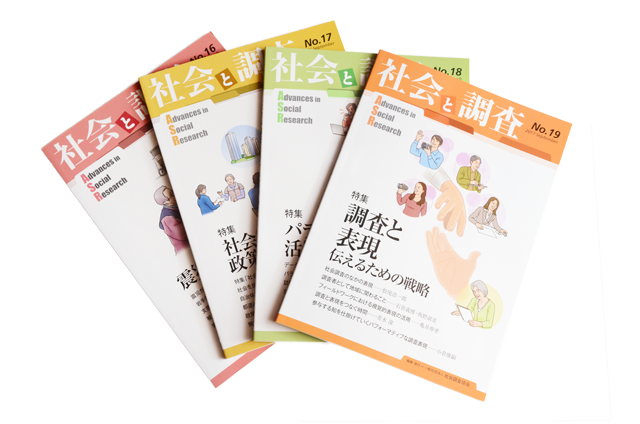
Advances in Social Research
Encyclopedia of Social Research
To commemorate its 10th anniversary, JASR published the Encyclopedia of Social Research (in Japanese) with Maruzen Publishing Co., Ltd. The editorial board is mainly comprised of the directors of the Association.
In addition, many social research specialists outside the Association have also made valuable contributions to the Encyclopedia. It contains 450 sub-articles; A5-size; 896 pages. The content is outlined below.
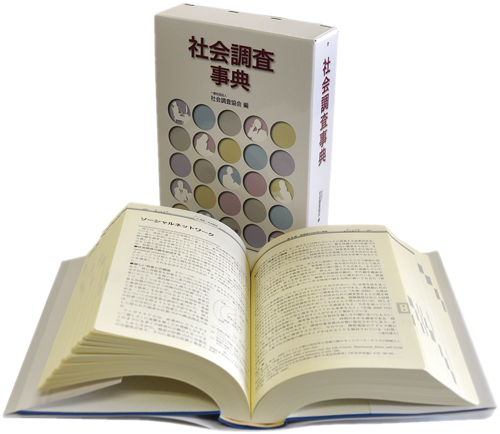
Encyclopedia of Social Research
Part I: Social Research Basics and Theories
- 1. What is social research?
- 2. Social research history and significance
- 3. Research ethics
- 4. Types of social research
- 5. Contemporary problems surrounding social research
Part II: Social Research Methodology
- 1. Designing social research
- 2. Research methods
- 3. Conducting social research
- 4. Statistical research methods
- 5. Questionnaire surveys
- 6. Measurement and aggregation
- 7. Statistical analysis methods
- 8. Qualitative research methods
- 9. Report and paper preparation
Part III: Practical Application in Varied Areas
- 1. Politics and law
- 2. Social psychology
- 3. Culture, social consciousness and the media
- 4. Class and inequality
- 5. Solidarity and social relationships
- 6. Population, family, and gender
- 7. Education
- 8. Rural areas? agricultural, mountain and fishing villages
- 9. Urban areas
- 10. International sociology and ethnicity
- 11. Economy
- 12. Marketing research
- 13. Industry and labor
- 14. Social welfare
- 15. Public health and medical care
- 16. Environment
- 17. Science and technology
Part IV: Official Statistics and Social Research in Japan and Abroad
- 1. Official statistics
- 2. Social surveys in Japan and world
- 3. Social research in various countries
- 4. Data archives
- 5. Secondary analysis
- 6. Social Researcher Certification Program








